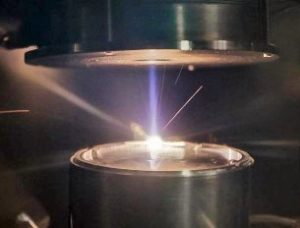
Which Industries Rely Upon Electron Beam Welding?
EBW uses electrons formed into a finely-focused beam with enough power density to melt metals instantaneously. The weld takes place in a vacuum, is normally be achieved without filler and in a single pass, and with minimal metallurgical disturbance. EBW remelts parent material in a vacuum, resulting in high quality welds with minimal distortion
EBW has many applications for industries that require strong, reliable joints for complex parts. These include:
1) Aerospace Manufacturing
Flight-critical components which require welding will often use EBW. The method offers low distortion and complete freedom from contamination when working with exotic alloys such as titanium and nickel alloys. The sterile vacuum prevents the risk of oxidation that could weaken the joint. Examples include:
- Critical rotating parts
- Bellows assemblies
- Combustion chamber
- Blades and nozzle guide vanes
- Bearing assemblies (with dissimilar materials)
- Gear and shaft assemblies
- Component salvage and repair
2) Automotive/Motorsport
EBW is used in many elements of automotive engineering. EBW is able to successfully join a complex array of metals – such as alloyed steels, titanium alloys. Parts and assemblies include:
- Clutch housings
- Gear assemblies
- Spur gears
- Suspension members and mechanical linkages
- Torsion springs and roll bars
- Bearings and driveshafts
- Pressure bottles
- Lip seals (welded with a seal in place)
- Turbine impellers to shafts (dissimilar materials)
3) Defence
Defence contracts involve some of the most demanding performance requirements. EBW is attractive due to its high quality and repeatability. Highly complex projects can be successfully fabricated from finish machined and heat treated components. Examples include:
- High strength equipment enclosures
- Underwater and space pressure vessels
- Heavy duty structures
- Titanium fuel cells
- Missile casings and launchers
- Radar wave guides and antennae
- Flight data collection “Black Boxes, which must be crash survivable
4) Medical Equipment Manufacturing
The autogenous capabilities of EBW – which allow welding without needing to introduce a filler material – ensures the biocompatibility of the part. EBW is used for medical instruments, surgical tools, and implantable devices. Examples include:
- Spinal implant devices
- Finger and knuckle implants
- Invasive growers
- Replacement hip and elbow joint
5) Oil & Gas
Hostile environments require corrosion, pressure, and stress resistance. EBW responds to this challenge due to the pin-point beam, which minimises the zones affected by the welding heat. Combined with the single-pass process, this results in high weld integrity and the ability to weld high strength materials. Sample parts include:
- Electrical measurement equipment
- Pressure sensors
- Temperature sensors
- Pipeline connectors
- Seismic sensors
- Turbines
- Drilling systems
- Stator and rotor assemblies
6) Power Transmission
Power transmission involves complex assemblies with dissimilar materials. Assemblies have to be able to withstand vibration and heat. Examples include:
- Gear-to-shaft and coupling-to-shaft assays
- Synchros-to-gears
- Spur gear assemblies
- Herringbone double-helical gears
- Fluid couplings
- Epicyclic sun gear and planet gear assemblies
- Shaft-to-impellor (dissimilar materials)
- Drive couplings
7) Nuclear Power Generations
This industry requires exceptional quality control and best practice procedures to be endorsed.
Typical applications for EB welding within this sector are: Fuel Rods, Heat Exchangers & Nuclear Waste Containers.
8) High strength Electronic Enclosures and Signal feed-throughs.
The challenge of installing sensors and electronics in high strength enclosures for deep water operation is solved by using EB welding. EBW produces very narrow, low total heat input welds in high strength materials such Nickel and Titanium alloys.
Sensitive devices and components can be contained in welded enclosures or feed-throughs without thermal damage.
EB welding takes place in a vacuum, so an evacuated containment can also be achieved as a by-product of the process.
9) Pressure vessels
The range of industries using EB welded Pressure Vessels produced by EBP includes;
Sub-Sea for Defence and Oil & Gas production
Space for launch and satellite systems
Aerospace, missile and airframe installations
Motor sport fuel and hydraulic equipment
Process Industries including food and pharmaceuticals
Materials include;
Titanium, Aluminium alloys, high spec steels, Nickel based alloys
10 )Environmental Monitoring
Continuous Environmental Monitoring (CEM), is an essential and growing requirement.
This can involve placing sensors and filters into very harsh conditions, requiring very special materials.
EBP has experience in manufacturing sensor housings in high temperature materials such as Nickel alloy 718 & C263 for use in high temperature processes.
We also have experience in EB welding sintered micron level filter panels for CEM applications.
11) Additive manufacturing (AM)/3D Printing
AM can now be used to create in high strength materials design features impossible with legacy methods. The AM process for complex parts is slow and expensive, however, the unique design features are often localised.
EBW can be used to join AM components to conventionally manufactured parts to achieve a more cost-effective final assembly.
Some AM components contain un-fused powder which must be removed. Apertures for powder removal can be sealed with minimal distortion using EBW.
Learn More
The demand for manufacturing innovation has never been higher. As companies seek ways to reduce energy consumption, increase efficiency, and create new solutions to advanced challenges, EBW has maintained its position as a reliable, cost-effective solution. We are certified above the industry standard in each of the main EBW sectors and have an extensive portfolio of parts and assemblies. Download our free Best Practice Guide today to learn more about EBW benefits. Typical applications for EBW within this sector are fuel rods, heat exchangers, and nuclear waste containers.
![]()
